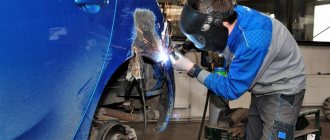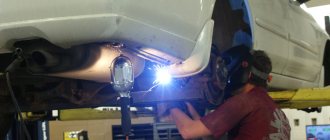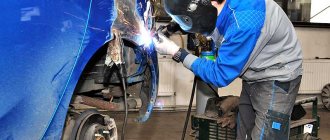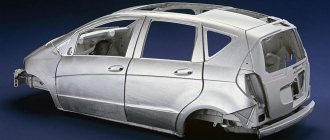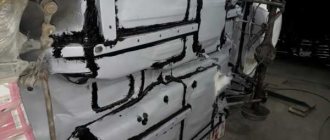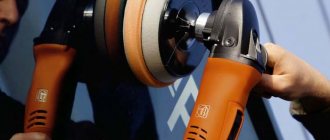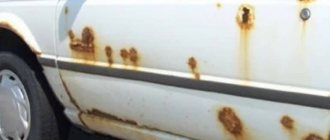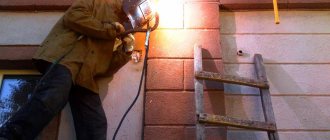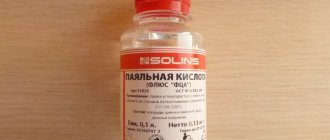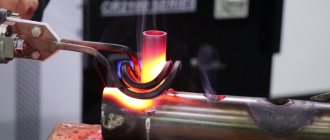Welding work on a car body may be required in two cases - severe wear due to corrosion and damage after road traffic accidents (RTA).
Exposure to high temperatures destroys factory protection, deteriorates the properties of metals and causes accelerated corrosion in the welding zone. But the skillful use of modern technologies minimizes the severity of the consequences.
Features of car body welding
The main specificity of welding body iron is its small thickness. The car body is designed and manufactured for minimum weight, so thin rolled sheets are used, and strength is ensured by the three-dimensional design and reinforcement in the right places.
There are also massive parts, but there are not many of them, and they do not create problems during welding. Therefore, the main thing in this kind of repair is to orient the equipment, technology and experience of the contractor to work with a small thickness of steel sheet, less than a millimeter.
In the factory, spot welding is used. The body parts are compressed by the vise of the conductors, after which the welding robot, with its tongs, sets the points at which two or more sheets of metal are melted and firmly fastened.
It is difficult to implement this method during repairs, and there is no need for it. Spot welding is a typical conveyor technology.
On topic: How to degrease a body before polishing, painting and washing
The second feature is the absence of continuous seams. Under such an impact, the metal will be strongly moved and change its geometric dimensions.
If, out of ignorance and for reasons of increased strength, one side of the body is welded in this way, then it may turn out to be several centimeters shorter than the opposite one, and the body will be irreparably damaged. Therefore, they weld, simulating spot welding, with short stitches, observing the symmetry of heating the metal parts.
How much does a car body repair cost on average - approximate prices
The proper operation of the car and the safety of the driver and passengers while driving depend on the condition of the body. It happens that the body requires repair. Such a service in Russia costs from 200 to 17,000 rubles or more .
What is this?
Body repair refers to a set of measures to restore the normal appearance of this part of the car.
The need to replace the hood arises for various reasons:
- Natural wear and tear.
- Damage to the body due to an accident.
- Hitting a curb.
- Actions of vandals.
In any case, you need to contact a car service. The technician will carry out diagnostics, announce the approximate cost and, with the client’s consent, begin work.
What does the price depend on?
Body repairs cost different things at different service stations. The following factors affect the price:
- The model of car.
- Type of damage.
- Difficulty of work.
- Master's qualification.
- Departure of the technician to the address where the customer’s car is located.
- Materials and equipment used.
- Urgency of order fulfillment.
- Service station pricing policy.
- The need to dismantle certain parts.
- Availability of a warranty on the car.
The more labor-intensive the work, the more money the specialist will have to pay. Urgency and calling a specialist to the location of the car are paid additionally. If the car is under warranty, repairs can be carried out free of charge or at a significant discount. The more prestigious the car dealership, the higher the prices it sets for its services.
Types of repairs
There are the following types of repairs:
- Removing scratches, abrasions, breaks, cracks and other similar defects.
- Restoring the correct geometry. It's expensive.
- Elimination of hidden defects. To identify them, diagnostics are carried out. They are eliminated in the same way as visible defects. The price depends on the complexity of the process.
- Replacement of doors, fenders, hood cover. If the part cannot be restored, then it is changed taking into account the model and make of the car. This type of repair is expensive due to the high prices of body parts.
Approximate prices
Russian car repair shops set the following prices for body restoration:
- Installation of a new hood - from 1250 rubles .
- Replacing the bumper cover – 1200.
- Installing the trunk lid – 1500.
- Wing replacement – from 850 rubles .
- Installation of new spars - from 4500 to 8500 rubles .
- Rear panel installation – from 4000 to 8500 .
- Changing the side threshold – 3700.
- Replacement of racks with part of the threshold - from 6,500 rubles .
- Sidewall repair – 10250-16500 rubles .
- Restoring one door – 1500-4500.
- Hood repair – 2800-6800 rubles .
- Panel roof restoration – 7500-9500.
- Repair of racks - 8600-13000 rubles .
- Restoring headlights – 500.
- Part replacement – 9800 rubles .
- Protective type of polishing – 3000.
- Abrasive type of polishing – 8500.
- Painting – 6700-7100 rubles .
- Straightening – from 200 .
- Restoring a part - 7800-9000 rubles .
What type of welding to use to weld the body?
The choice of welding machine will ultimately determine the quality and speed of the work. An experienced specialist will cope with any technology, but will waste time unreasonably, and most likely simply will not engage in outdated welding methods.
For example, no one has used an oxygen-acetylene torch for a long time, although it was with its help that car bodies were repaired before the advent of modern semi-automatic machines.
Semi-automatic
The main type of welding machine in body repair is a semi-automatic machine operating in an inert gas environment. The welding method is so simple that it is accessible to any novice repairman.
Before the widespread dissemination of this technology, the art of welding as applied to body iron had to be learned a lot. Now this is available for the car owner to do independently if he wants to personally repair the body.
The essence of this welding is to feed thin copper-plated steel wire into the weld zone from a coil using an electric motor with a gearbox. One output of the electric arc supply voltage is connected to the guide rollers and the nozzle through which the wire passes, the second - to the parts being welded.
Through the same nozzle, gas is supplied to the arc area, usually carbon dioxide from a cylinder with a reducer, which does not allow oxygen, which interferes with the clean fusion of parts. Sometimes a little argon is mixed with carbon dioxide to obtain better seams.
When you press the button located on the torch of the welding machine, voltage is simultaneously applied to the wire, the supply is turned on and the carbon dioxide valve opens.
The mode is selected by manual or automatic adjustment of the basic welding parameters:
- arc current, reliable penetration of the seam, the so-called penetration, depends on it;
- wire feed speed, the higher the current, the greater the mass of filler metal should be;
- the flow of incoming gas is regulated by a reducer on the cylinder.
Typically, the current is set slightly higher than required, and the touch time is adjusted by the welder by the duration of the button press. A well-welded short stitch is formed without burning through thin metal.
Inverter
An inverter is a power electronic converter of high AC voltage into low DC voltage, which can be used to power the welding arc.
Sometimes there is still a misconception that an inverter is a welding machine for working with electrodes, but it is more compact and lighter than an outdated welding transformer. That is, according to the authors of the statement, a semi-automatic device is not an inverter.
In fact, this term refers only to the conversion method, and currently all welding machines, including semi-automatic machines and everything else, use this inverter principle.
This is interesting: How to unscrew a brake pipe with torn edges
The essence of the inverter is an increased conversion frequency. The physics is such that a transformer, and it must be present at least for galvanic isolation of the network and electrodes, is smaller in weight and dimensions, the higher the frequency at which it operates.
The network frequency is 50 Hz, such transformers for acceptable welding power weigh about 20 kg. The inverter usually operates at a frequency of 50-100 kHz, that is, a thousand times higher, so its transformer is almost invisible among other electronic components, and the entire device can weigh 2-3 kg.
Manual arc welding
If we talk about outdated technologies, but not yet completely obsolete, then this is manual welding with a consumable electrode coated with flux. The method works well when welding massive parts by an experienced specialist, but is completely unsuitable for body work.
Of course, there are specialists with extensive experience who can easily weld a tin can with an electrode, but in practice everyone uses a semi-automatic machine.
As a last resort, without a bulky cylinder, using flux-cored wire. But this has its drawbacks: consumables are expensive, and the quality of work is low.
Price list
Details Author: Super User Category: Sample Data-Articles Published March 17, 2016
Wheel alignment prices*
| Domestic cars* | |||
| Brand | VAZ, IZH | Sobol, Niva | AZLK, Volga, ZAZ |
| Wheel alignment check | 500 | ||
| Wheel alignment | 800 | 1000 | 1000 |
| Convergence | 500 | 500 | 500 |
| Foreign cars* | |||
| Adjustments | Front axle | Rear axle | Front+Rear |
| Wheel alignment check | 500 | ||
| Wheel alignment | 700 | 700 | 1400 |
| Convergence | 500 | 500 | 1000 |
TO prices*
| № | Auto repair | VAZ 2101-2107 | VAZ 2108-21099 | VAZ 2110 | Niva | 16 VALVE | Foreign cars | SUVs |
| 1 | Replacing the manifold gasket (exhaust + inlet) | 1500 | 1500 | 1500 | 1800 | 1400(intake) 800(exhaust) | 2250 | 2250 |
| 2 | Replacing valve stem seals with valve adjustment and removing the cylinder head | 2500-4500 | 2500-4500 | 2500-4500 | 2500-4500 | 7000 | 7000 | 7500 |
| 3 | Replacing the ram drive | 450 | — | — | — | — | — | — |
| 4 | Replacing the crank pulley/shaft | 350 | 350 | 350 | 450 | 450 | 650 | 650 |
| 5 | Replacing the Cylinder Head Mounting Plugs | 3000 | 3000 | 3000 | 3500 | 3600 | 8000 | 8000 |
| 6 | Replacing the Cylinder Block Mounting Plugs | 950 | 950 | 950 | 1000 | 1250 | 1250 | 1250 |
| 7 | Replacing the chain guide | 450 | — | — | — | — | 4000 | 4000 |
| 8 | Replacing the fuel pump | carb 500-eng 1500 | carb 500 eng 1500 | 750 without sanitary tank 1500 with sanitary tank | carb 500 | 750 without sanitary tank 1500 with sanitary tank | 1000 | 2000 |
| 9 | C/o gas tank | 500 | 1500 | 1500 | 800 | 1500 | 1000 | 2000 |
| 10 | Engine overhaul | 12000 | 12000 | 12000 | 12500 | 14000 | 16500 | 19500 |
| 11 | Block head repair | 5000 | 5000 | 5000 | 5000 | 6500 | 9500 | 9500 |
| 12 | Replacing the Cylinder Head Gasket | 2700 | 2500 | 2500 | 2700 | 3500 | 4650 | 5000 |
| 13 | Replacing the valve cover gasket | 300 | 150 | 150 | 300 | 1850 | 550 | 550 |
| 14 | Replacing the crankcase gasket | 1200 | 1000 | 1000 | 1500 | 1000 | 1450 | 1450 |
| 15 | Replacing the engine mount (pillow) (1 pc.) | 350 | 350 | 350 | 400 | 500 | 800 | 1000 |
| 16 | Replacing the front crankshaft oil seal | 950 | 1200 | 1200 | from 950 | 1900 | 1850 | 1850 |
| 17 | Replacing the rear crankshaft oil seal | 2500 | 2500 | 2500 | 3500 | 2500 | 4000 | 4850 |
| 18 | Replacing the camshaft | 1500 | 1500 | 1500 | 1500 | 2850 | 2850 | 2850 |
| 19 | Replacing the timing chain | 2300 | — | — | 2300 | — | 3500 | 3500 |
| 20 | Replacing the timing belt | — | 1000 | 1000 | — | 1700 | 2000 | 2200 |
| 21 | Replacing the chain tensioner | 500 | — | — | 500 | — | — | — |
| 22 | Replacing the chain shoe | 2000 | — | — | 2200 | — | — | — |
| 23 | Replacing the oil pump | 2500 | 2000 | 2000 | 2500 | 2500 | 2500 | 3000 |
| 24 | Change of oil | 400 | 400 | 400 | 400 | 400 | 400 | 400 |
| 25 | C/o engine | 4500 | 4000 | 4000 | 5000 | 4500 | 8000 | 8000 |
| GEARBOX prices* | ||||||||
| № | Repair | VAZ 2101-2107 | VAZ 2108-21099 | VAZ 2110 | Niva | 16 valve | Foreign cars | SUVs |
| 1 | Replacement of the gearbox assembly | 2000 | 2000 | 2000 | 3000 | 2000 | 3000 | 4850 |
| 2 | Clutch replacement | 2100 | 2100 | 2100 | 3100 | 2100 | 3200 | 4850 |
| 3 | Replacing the shift link | 750 | 1200 | 1200 | 750 | 1200 | 1850 | 1850 |
| 4 | Replacing the flexible coupling | 850 | — | — | 1500 | — | — | — |
| 5 | Replacing the reverse sensor | 300 | 300 | 300 | 300 | 300 | 350 | 350 |
| 6 | Replacing the speedometer drive | 500 | 500 | 500 | 500 | 500 | 500 | 500 |
| 7 | Bulkhead from the bathroom | 4500 | 4500 | 4500 | 5000 | 4500 | 6000 | 7000 |
| 8 | Replacing the drive oil seal (CV joint) | — | 600 | 600 | 1500 | 600 | 1000 | 1500 |
| 9 | Replacing the gearbox shank oil seal | 800 | — | — | 1700 | — | — | — |
| 10 | Replacing the gearbox primary shaft oil seal | 3000 | 2250 | 2250 | 4000 | 2250 | 3850 | 3850 |
| CLUTCH prices* | ||||||||
| № | Car service | VAZ 2101-2107 | VAZ 2108-21099 | VAZ 2110 | Niva | 16 valve | Foreign cars | SUVs |
| 1 | Replacing the release bearing | 2000 | 2000 | 2000 | 3000 | 2000 | 3000 | 4850 |
| 2 | Replacing the clutch slave cylinder | 500 | — | — | 500 | — | — | — |
| 3 | Replacing the clutch master cylinder | 700 | 700 | 700 | 700 | |||
| 4 | Replacing the clutch cable with adjustment | — | 550 | 550 | — | 550 | 550 | 550 |
| 5 | Replacing clutch brake fluid | 300 | — | — | 300 | — | 300 | 300 |
| 6 | Replacing the clutch fork | 500 | 2100 | 2100 | 500 | 2100 | 3200 | 5000 |
| 7 | Clutch replacement | 2200 | 2200 | 2200 | 3200 | 2200 | 3200 | 5200 |
| 8 | Bleeding the clutch | 300 | — | — | 300 | — | 300 | 300 |
| REPAIR OF CARDAN SHAFT * | ||||||||
| № | Auto repair | VAZ 2101-2107 | VAZ 2108-21099 | VAZ 2110 | Niva | 16 valve | Foreign cars | SUVs |
| 1 | Replacement assembly | 500 | — | — | 500 | — | 1000 | 1000 |
| 2 | Replacing the outboard bearing | 1200 | — | — | 900 | — | 2000 | 2500 |
| 3 | Replacing the flexible coupling | 700 | — | — | 1000 | — | — | — |
| 4 | Replacing the rear crosspiece (on the card shaft) | 400 | — | — | 400 | — | — | 1000 |
| REAR AXLE car service price* | ||||||||
| № | Auto repair | VAZ 2101-2107 | VAZ 2108-21099 | VAZ 2110 | Niva | 16 valve | Foreign cars | SUVs |
| 1 | Replacing the rear axle | 2850 | — | — | 2850 | — | 3500 | 3500 |
| 2 | Beam replacement | 4000 | 2200 | 2200 | 5000 | 2200 | 2400 | 4000 |
| 3 | Replacing the gearbox | 2000 | — | — | front-3500 rear-2000 | — | 2500 | 3500 |
| 4 | Replacing internal CV joint | — | 1000 | 1000 | 2000 | 1000 | 1200 | 1450 |
| 5 | Replacing the axle shaft (outer CV joint) | 1000 | 1500 | 1000 | 1100 | |||
| 6 | Replacing the axle shaft seal, gearbox drive | 1100 | 800 | 800 | 2000 | 800 | 1000 | 1200 |
| 7 | Replacing the shank seal | 500 | — | — | 500 | — | — | 1150 |
| 8 | Replacement of shock absorber, strut (1 pc.) rear | 500 | 500 | 500 | 500 | 500 | 750 | 950 |
| 9 | Replacing the rear spring (1 piece) | 800 | 500 | 500 | 800 | 500 | 750 | 950 |
| 10 | Replacing a set of jet rods 5pcs | 1500 | — | — | 1500 | — | 2000 | 2500 |
| 11 | Replacing the transfer case | — | — | — | 1500 | — | — | 3500 |
| FRONT DRIVE price* | ||||||||
| № | Car service | VAZ 2101-2107 | VAZ 2108-21099 | VAZ 2110 | Niva | 16 valve | Foreign cars | SUVs |
| 1 | Replacing the drive assembly | — | 600 | 600 | 1500 | 600 | 1000 | 1200 |
| 2 | Replacing the outer CV joint (boot) | — | demon s/u drive-600 with s/u-1000 | demon s/u drive-600 with s/u-1000 | 1500 | demon s/u drive-600 with s/u-1000 | 1000 | 1100 |
| 3 | Replacing the internal CV joint (boot) | — | 1000 | 1000 | 1200 | 1000 | 1200 | 1450 |
| 4 | Replacing the boot clamp | — | 300 | 300 | 300 | 300 | 300 | 300 |
| FRONT SUSPENSION price* | ||||||||
| № | Repair | VAZ 2101-2107 | VAZ2108-21099 | VAZ 2110 | Niva | 16 valve | Foreign cars | SUVs |
| 1 | Replacing the front spring 1pc | 1000 | 900 | 900 | 1000 | 900 | 900 | 1000 |
| 2 | Replacement support bearing 1 piece | 900 | 900 | 900 | 1000 | 1200 | ||
| 3 | Replacement of the lower lever assembly (1 pc.) | 1200 | 700 | 700 | 1200 | 700 | 750-1500 | 950-2000 |
| 4 | Replacement of the upper lever assembly (1 pc.) | 700 | — | — | 700 | — | 700 | 1000 |
| 5 | Replacing silent blocks on a removed lever (1 piece) | 300 | 500 | 500 | 800 | 500 | 500 | 1000 |
| 6 | Replacement of the ball joint (1 pc.) | 400 | 300 | 300 | 400 | 300 | 300 | 400 |
| 7 | Replacing the front shock absorber (strut). (1 PC.) | 500 | 900 | 900 | 500 | 900 | 1000 | 1000 |
| 8 | Replacing front stabilizer bushings, 1 piece | 300 | 300 | 300 | 300 | 300 | 300 | 300 |
| 9 | Replacing the crab of the longitudinal extension bracket (1 pc.) | — | 400 | 400 | — | 400 | — | — |
| 10 | Replacement stabilizer strut 1 pc. | — | 300 | 300 | — | 300 | 300 | 300 |
| STARTER price* | ||||||||
| № | Car service | VAZ 2101-2107 | VAZ 2108-21099 | VAZ 2110 | Niva | 16 valve | Foreign cars | SUVs |
| 1 | Starter replacement | 800 | 550 | 550 | 800 | 550 | 800 | 1000 |
| 2 | Replacing the retractor on the starter | 1100 | 300 | 300 | 1100 | 300 | 1100 | 1300 |
| 3 | Replacing the starter bendix | 1500 | 1100 | 1100 | 1500 | 1100 | 1500 | 1500 |
| 4 | Replacing starter brushes | 1500 | 1100 | 1100 | 1500 | 1100 | 1500 | 1500 |
| 5 | Replacing starter bushings | 1500 | 1100 | 1100 | 1500 | 1100 | 1500 | 1500 |
| 6 | Replacing the starter bushing in the gearbox | — | 800 | 800 | — | 800 | — | — |
| BRAKE SYSTEM prices* | ||||||||
| № | Car service | VAZ 2101-2107 | VAZ 2108-21099 | VAZ 2110 | Niva | 16 valve | Foreign cars | SUVs |
| 1 | Replacement brake disc 1 piece | 550 | 550 | 550 | 950 | 550 | 650 | 650 |
| 2 | Replacement of front brake cylinders (1 t.) | 750 | 550 | 550 | 950 | 550 | 450 | 450 |
| 3 | Replacing the caliper assembly | 650 | 550 | 550 | 800 | 550 | 650 | 850 |
| 4 | Replacement of brake hose, front and rear tubes 1 pc. | 500 | 500 | 500 | 500 | 500 | 500 | 500 |
| 5 | Replacing the master brake cylinder | 700 | 700 | 1000 | 800 | 1000 | 1000 | 1000 |
| 6 | Replacement rear brake cylinder 1 pc. | 400 | 400 | 400 | 400 | 400 | 400 | 650 |
| 7 | Replacing the rear pads (drum) behind the axle | 800 | 800 | 800 | 800 | 800 | 800 | 1250 |
| 8 | Replacing rear pads (disc) for the axle | — | — | — | — | — | 500 | 600 |
| 9 | Replacing front pads (axle) | 600 | 500 | 500 | 600 | 500 | 500 | 600 |
| 10 | Replacing handbrake pads (Disc brakes) | 1300 | 1300 | |||||
| 11 | Replacing the vacuum brake booster | 800 | 800 | 1000 | 800 | 1000 | 1100 | 1100 |
| 12 | Replacing handbrake cables | 1100 | 1100 | 1100 | 1100 | 1100 | 1250 | 1250 |
| 13 | Replacing the handbrake rod (handle) | 500 | 800 | 1200 | 500-1200 | 1200 | 1000 | 1000 |
| 14 | Development of 1st side caliper guides | — | 300 | 300 | — | 300 | 300 | 300 |
| 15 | Replacing brake fluid | 800 | 800 | 800 | 800 | 800 | 1200 | 1200 |
| STEERING price* | ||||||||
| № | Auto repair | VAZ 2101-2107 | VAZ 2108-21099 | VAZ 2110 | Niva | 16 valve | Foreign cars | SUVs |
| 1 | Replacing the steering gear | 1650 | — | — | 1950 | — | 1650 | 1650 |
| 2 | Replacing the steering rack without power steering - with power steering | — | 1500- 2000 | 1500- 2000 | — | 1500- 2000 | 2600 | 2600 |
| 3 | Replacing the steering rack boot | — | — | — | — | — | 600 | 650 |
| 4 | Replacing the power steering pump | — | — | — | 950 | 950 | 1250 | 1250 |
| 5 | Replacement steering tip 1 pc. | 300 | 300 | 300 | 300 | 300 | 300 | 300 |
| 6 | Replacing the short rod assembly | 400 | — | — | 400 | — | — | — |
| 7 | Replacing the middle link | 400 | — | — | 400 | — | — | — |
| 8 | Replacing the pendulum | 500 | — | — | 550 | — | — | — |
| 9 | Replacing the steering linkage assembly | 1200 | — | — | 1200 | — | — | From 1500 |
| 10 | Replacing the steering rod (on the rack) | — | 500 | 500 | — | 500 | 600 | 600 |
| Hub* | ||||||||
| № | Type of work | 2101-2107 | 2108-21099 | 2110 | Niva | 16 valve | Foreign cars | SUVs |
| 1 | Replacement assembly | 750 | 750 | 750 | 1250 | 750 | 1250 | 1250 |
| 2 | Replacing the front hub bearing 1 pc. | 850 | 1000 | 1000 | 1250 | 1000 | 1000 | 1250 |
| 3 | Wheel bearing clearance adjustment 1 pc. | 150 | — | — | 150 | — | 150 | 150 |
| 4 | Removing and installing the steering knuckle | 850 | 750 | 750 | 1250 | 750 | 1450 | 1850 |
| 5 | Replacing the rear wheel bearing (half shaft) | 1000 | 500 | 500 | 1200 | 500 | 1000 | 2000 |
| GENERATOR REPAIR price* | ||||||||
| № | Auto repair | VAZ 2101-2107 | VAZ 2108-21099 | VAZ 2110 | Niva | 16 valve | Foreign cars | SUVs |
| 1 | Generator replacement | 600 | 500 | 500 | 600 | 600 | 850 | 850 |
| 2 | Replacing the alternator belt | 300 | 300 | 300 | 300 | 300 | 450 | 450 |
| 3 | Replacing generator brushes without removal | 250 | 200 | 200 | 250 | 250 | 450 | 450 |
| 4 | Generator diagnostics | 100 | 100 | 100 | 100 | 100 | 250 | 250 |
| 5 | Replacing the diode bridge | 1250 | 1150 | 1150 | 1550 | 1250 | 1250 | 1250 |
| 6 | Replacing generator bearings | 1600 | 1500 | 1500 | 1600 | 1600 | 2000 | 2000 |
| SILENCER REPAIR* | ||||||||
| № | Car service | 2101-2107 | 2108-21099 | 2110 | Niva | 16 valve | Foreign cars | SUVs |
| 1 | Replacing the exhaust pipe gasket | 800 | 500 | 500 | 800 | 500 | 950 | 950 |
| 2 | Replacing the resonator | 500 | 400 | 400 | 500 | 400 | 550 | 650 |
| 3 | Muffler replacement | 500 | 400 | 400 | 500 | 400 | 550 | 600 |
| 4 | Muffler repair (welding work) | from 300 | ||||||
| 5 | Replacing corrugations | — | — | — | — | 1000 | 1250 | 1850 |
| 6 | Replacement assembly | 1450 | 1450 | 1450 | 1450 | 1450 | 1850 | 1850 |
| 7 | Catalyst replacement | 500 | 1700 | 500-1700 | 500 | 500-1200 | 1200 | 1200 |
| RADIATOR AND COOLING SYSTEM price* | ||||||||
| № | Car service | VAZ 2101-2107 | VAZ 2108-21099 | VAZ 2110 | Niva | 16 valve | Foreign cars | SUVs |
| 1 | Replacing the cooling radiator | 1000 | 1200 | 1200 | VAZ1200-2500Chevrolet | 1200 | 1250 | 1450 |
| 2 | Replacing the pipe (1 pc.) next. 200 each | 400 | 400 | 400 | 400 | 400 | 400 | 400 |
| 3 | Replacing the thermostat | 650 | 650 | 650 | 650 | 650 | 650 | 750 |
| 4 | Replacing the water pump (pump) | 950 | 2000 | 2000 | 1050 | 2500 | 2150 | 2150 |
| 5 | Replacing the cooling fan | 450 | 450 | 450 | 550 | 750 | 750 | 750 |
| 6 | Replacing the stove faucet | 750 | 750 | 750 | 750 | 750 | 950 | 950 |
| 7 | Replacing the heater radiator (stove) | 1250 | 1400(08-99)-2000(13-15) | 1850 | 1250 without air conditioning | 1850 | 5000 | 5000 |
| 8 | Replacing the electric motor of the heater (stove) | 1000 | 1000 | 1650 | 1250 | 1650 | 650 | 650 |
| 9 | Replacing heater air ducts (assembled) | 1200 | 2500 | 3600 | 1350 | 3600 | 3650 | 3650 |
| 10 | Repair of the damper control mechanism | from 500 | ||||||
| OTHER AUTO REPAIR WORK* | ||||||||
| № | Car service | 2101-2107 | 2108-21099 | 2110 | Niva | 16 valve | Foreign cars | SUVs |
| 1 | Computer diagnostics | 500 | 500 | 500 | 500 | 500 | 500 | 500 |
| 2 | Suspension diagnostics | 300 | 300 | 300 | 300 | 300 | 300 | 300 |
| 3 | Engine compression measurement | 400 | 400 | 400 | 400 | 400 | 400 | 400 |
| 4 | Changing the engine oil and filter | 400 | 400 | 400 | 400 | 400 | 400 | 400 |
| 5 | Replacing the fuel filter | 300 | 300 | 300 | 300 | 300 | 450 | 450 |
| 6 | Replacing the fuel filter (in the tank) | — | — | — | — | — | 1200 | 1200 |
| 7 | Changing the gearbox oil | 400 | 400 | 400 | 400 | 400 | 500 | 500 |
| 8 | Coolant replacement | 400 | 400 | 400 | 400 | 400 | 400 | 400 |
| 9 | Changing the oil in the drive axle | 400 | 400 | 400 | 400 | 400 | 500 | 500 |
| 10 | Adjustment of valves | 850 | 850 | 850 | 850 | — | 1250 | — |
| 11 | Clutch adjustment | 350 | 150 | 150 | 350 | 150 | 150 | 150 |
| 12 | Adjusting the hand brake | 350 | 350 | 350 | 350 | 350 | 350 | 350 |
| 13 | Bleeding the brakes | 500 | 500 | 500 | 500 | 500 | 500 | 500 |
| 14 | Clutch bleeding with adjustment | 350 | — | — | 350 | — | From 250 | From 250 |
| 15 | Replacing spark plugs | 300 | 300 | 300 | 300 | 300 | 400 | 500 |
| 16 | Pulling the chassis | 650 | 650 | 650 | 650 | 650 | 650 | 850 |
| 17 | Replacing the cabin filter | — | 350 | 500 | 500 | 500 | 350 | 350 |
| 18 | Replacing the air filter | 150 | 150 | 150 | 150 | 150 | 150 | 150 |
| 19 | Comprehensive diagnostics of internal combustion engines | 1000 | 1000 | 1000 | 1000 | 1000 | 1200 | 1200 |
| 20 | Replacing the speedometer cable | 600 | 550 | 650 | 600 | 650 | 950 | 950 |
| 21 | Replacing the windshield wiper motor | 300 | 300 | 300 | 300 | 300 | 500 | 500 |
| *If difficulties arise during car repairs, the cost of repairs can be changed by agreement with the client. For prices for repairs of imported vehicles, please call! |
www.tehno-express.ru
Preparatory work
Before welding, the parts must be completely cleaned of dirt and oxides. This is the basis for both a high-quality seam and the further preservation of the body in this place.
The method of connecting parts is selected. Thanks to the semi-automatic machine, this is not critical; you can easily weld parts end-to-end or with overlap in any spatial position. The apparatus is being prepared. The nozzle is cleaned or replaced, wire and carbon dioxide reserves are checked.
On test pieces of similar metal, the modes, current, supply and pressure (flow) of gas are set. The strength of the test connection is checked.
Preparation
Before starting welding work, you need to prepare the car body. First of all, it is necessary to clean the treated areas of all contaminants. Next, paint and corrosion are removed from these fragments of the car body by grinding. You also need to check the electrical network of the room where you plan to carry out welding work, whether it will withstand the load of the welding machine.
If the network meets the requirements, the carbon dioxide semi-automatic machine must be charged with welding wire. To do this, you first need to remove the gas nozzle from the burner and unscrew its copper tip with a wrench. Next, set the required current polarity by moving the pressure roller with the wire to the side. This parameter is determined by the type of wire used. For regular wire, a plus is set on the torch, and a minus on the clamp, and vice versa for flux-cored wire. After this, the wire is inserted 10 - 20 cm into the feed channel and the pressure roller is returned to its original position.
As a result, the wire should end up on the drive roller in the hollow, but not crumble. Then the carbon dioxide semiautomatic device is connected to the network and the key on the burner handle is pressed. First, the supply of gas begins, then current and wire. Finally, you need to select a copper tip, put it on the wire and install the gas nozzle on the semi-automatic machine. To better understand how to prepare a carbon dioxide semi-automatic machine for operation, you can watch the video.
How to weld a car body with a semi-automatic machine
Welding is carried out with short stitches or points (welding rivets). In the second case, a hole is drilled (usually at the site of the factory point), after which it is welded, both parts are fused and the gap is filled with metal.
If the metal is very thin, then there is no point in greatly reducing the welding current. You need to use short touches, quickly pressing the torch button, to throw the metal wire onto the sheets, not allowing them to burn out. After which it is more confident to melt the resulting thickened seam, giving it a marketable appearance and strength.
You cannot cook with glasses, especially without any protection at all, closing your eyes at the moment you press the button. It is necessary to use a “chameleon” type mask, which automatically shades when the arc is ignited and returns transparency immediately after the button is released. All processes will be perfectly visible, quality is guaranteed.
How much?
The price list for body repairs of cars from our car service center is publicly available. When you come to us, you can estimate in advance how much it will cost you. Many prices start from a minimum cost and depend on:
- on the degree of damage;
- labor intensity of the process;
- amount of materials used;
For example, the price for exhaust hood (geometry restoration) and car body repair starts from 3,500 rubles .
The same work, only of increased complexity - after a serious accident - starts at 11,500 rubles .
Welding the body with an electrode
If there is an urgent need to use manual welding, then you should take a thin electrode, an inverter with deep current regulation and try to select a mode using the same principle that was described for welding a thin sheet with a semi-automatic machine. That is, with quick touches, not allowing the metal to burn out.
No stitches can be made in one pass. And electrodes are best used for alternating current; they are the best to ignite and hold the arc from the inverter. Rather, it will be a problem to quickly pay it off.
Is it possible to cook a car body with an inverter?
If you use the word “inverter” as a designation for a manual arc apparatus, then there will be a lot of inconvenience, but it can be boiled. An example method is described above. As for the true meaning of the term “inverter”, other devices now simply do not exist for a long time; they are all inverter, including any semi-automatic device.
Inverter Application
You can also use an inverter to weld the car body. Typically, this tool is used to speed up work. Its operating principle is based on the use of high frequency currents (30 - 40 kHz, in contrast to 50 Hz for other welding devices). The inverter is characterized by compactness and high speed of welding. This instrument has many operating modes, which helps the performer in mastering. Therefore, it is recommended for novice users to cook with an inverter. Finally, the device can be used even in a network with reduced voltage.
The disadvantages of the inverter include high cost, sensitivity to dust, and the inability to work with metal thicker than 3 mm. In addition, resistance welding with this tool produces a thick, uneven seam and leads to strong heating of the metal, which may result in the formation of thermal deformations.
As for the technology of work, resistance welding using it is carried out in the same way as with a conventional welding machine. The difference between these devices is constructive and consists only in the principle of voltage supply.
How to treat the body after welding
The metal must be clean before welding begins. But in its process it will inevitably be oxidized. For protection, a primary primer is used, it is called a primer.
The primer can be acidic (phosphate, reactive, there are many names, but the essence is the same, it is an etching primer) or epoxy.
The first works better against oxide residues, but protects worse in the long term. Epoxy is good as protection, you can put putty on it and the second layer of primer - filler - holds better. Putty should not be applied to an acid primer.
There is no clear choice; the master must decide, he knows better than the conditions. But then everything goes according to technology - the seams are protected with body sealant and painted or coated with protective compounds for the underbody.
It is possible to use compositions for hidden cavities. The main task is to completely block the access of moisture and oxygen to the overheated metal of the weld, the resistance of which has been lost, even if alloying additives were present in it.
